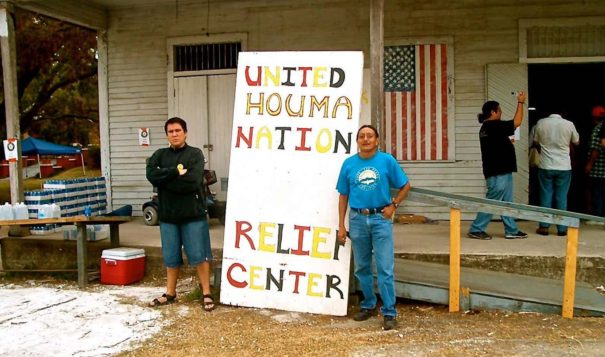News Article Article pages that do not meet specifications for other Trust Project Type of Work labels and also do not fit within the general news category.
Tribes brace for Tropical Storm Barry

Louisiana tribe evacuates citizens to shelters provided by federally-recognized tribes ** Updated Saturday 9 am EST
Tropical Storm Barry is expected to be a full-blown hurricane by the time it hits land in the gulf coast early Saturday morning. It is the first hurricane of the season.
For days Chief August Creppel of the United Houma Nation, south of New Orleans, and his staff have been issuing warnings and preparing its 17,000-plus members to evacuate 24 hours in advance. The tribe’s headquarters is in Golden Meadow along the gulf and in the direct path of the storm. Most of the members live in Lafourche and Terrebonne Parish which are both under emergency evacuation orders by local officials.
“Definitely thousands of our people will be affected by the hurricane,” warns the chief. He also serves as firefighter and will be on duty until Monday morning.
“We have a radio station,” says Creppel. “I have a council of people in different areas who keep in contact with local communities. We also have a tribal website we put out information.”
On the front page of the tribe’s website is a form members can fill out to report storm damage and request funds for repairs once they return home.
Tribal members packed their bags and piled furniture high on Thursday to try and avoid the expected floodwaters as much as possible. Nothing is guaranteed because the storms seem to be increasing due to climate change.
A Category 1 hurricane used to be “no problem,” said Chief Creppel. “Normally our people would just ride it out, but now it doesn’t take much high water and our people are already flooded.”
Mother Jones magazine reports about other tribes that will be impacted. “It is frustrating. Another hurricane season and we have to make sure people are safe,” Chantel Comardelle, tribal secretary of the Biloxi-Chitimacha-Choctaw, told Mother Jones’ Nicole Javorsky in a story headlined: “98 Percent of Their Island Is Underwater. Now Tropical Storm Barry Is Headed Their Way.”
Category 1 hurricanes have “very dangerous winds” between 74 and 95 mph that “will produce some damage,” according to the National Oceanic and Atmospheric Administration.
The National Hurricane Center says the storm “could bring 3 to 6 feet of water inland to an area from the mouth of the Atchafalaya River (some 60 miles south of Baton Rouge) to Shell Beach (20 miles southeast of New Orleans),” according to NPR.
The administration’s website states that “well-constructed frame homes could have damage to roof, shingles, vinyl siding and gutters. Large branches of trees will snap and shallowly rooted trees may be toppled. Extensive damage to power lines and poles likely will result in power outages that could last a few to several days.”
The Mississippi River is at the highest it’s been in 70 years since officials have been keeping records, said Creppel.

Creppel has seen a lot of change in the land.
There were ditches and waterways where the water could drain when he was a child. “Now it’s all built up and the waterways are smaller.” He says others remember going out to areas where there used to be farmlands and today those lands have washed away so now instead of farming people are fishing in the area.
Because they are only state-recognized tribe he will not get direct federal aid to help his tribal members. They will rely on state assistance, the goodwill of donors and emergency-assistant groups like the Red Cross, which has already contacted the tribe.
“We can do more for our people once we get federal recognition,” he says. “Right now, I’m trying to push through Congress to get a bill passed.”
Louisiana has 11 state-recognized tribes, the Houma Nation is the largest, and four federally-recognized tribes in the state.
“We have a few tribes that are ready to step up and help us out,” Creppel said.
The Tunica Biloxi tribe has a big pavilion and are set up to host storm evacuees. Tunica is a three-hour drive away.
Houma citizens can also seek shelter with the Mississippi Band of Choctaw which is a five- to six-hour drive away. Both of those tribes are federally-recognized.
The chief says he wants to “make sure our citizens get to safe ground.”
Creppel said tribal members will return home and “wash the mud out and start all over again” once the danger has passed.
Patty Talahongva, Hopi, is the executive producer for Indian Country Today based in Phoenix. Email: ptalahongva@IndianCountryToday.com or on Twitter: @witespider.
